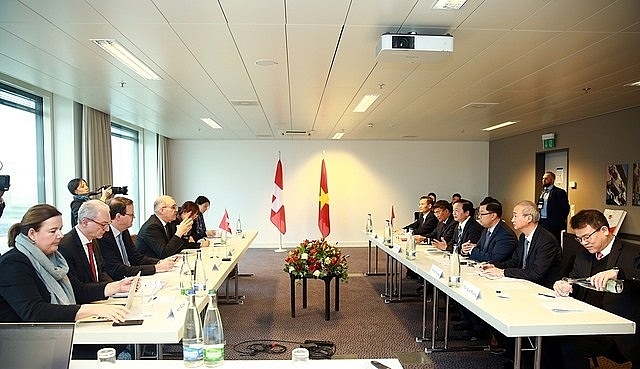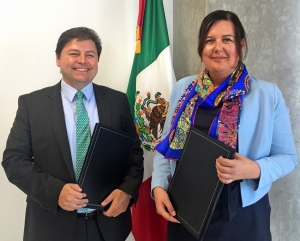Switzerland sees downside as FTA not yet reached
The interview came after the Swiss government published its Southeast Asia Strategy on February 15 that defines Switzerland’s objectives for 2026 within ASEAN and with each of the 11 countries in the region.
 |
| Deputy Prime Minister Tran Hong Ha met with Switzerland’s Minister of Economic Affairs, Education, and Research on the sidelines of the World Economic Forum in Davos earlier this year. Photo by VGP |
In its plan for Vietnam, the strategy states, "Switzerland is working towards the conclusion of an FTA as a way of further improving the conditions for business and countering the existing discriminatory treatment of Swiss companies as opposed to those based in the EU."
The European Free Trade Association (EFTA) group's four non-EU countries, namely Iceland, Liechtenstein, Norway and Switzerland, constitute a population of 14 million people and the world’s ninth-largest trader in goods and the fifth largest in services.
Explaining what was meant by discriminatory treatment, the spokesperson for SECO that is responsible for FTA negotiations between Switzerland, the EFTA, and other countries said, “We would like to emphasise that Vietnam does not intentionally treat Swiss companies in a discriminatory manner. The differences in treatment are a logical consequence of the preferential relations that the EU has with Vietnam that Switzerland does not yet have.”
“Since the EU-Vietnam FTA came into force, the majority of bilateral trade between Vietnam and the EU is liberalised and Vietnam further committed to abolish the remaining tariffs gradually on almost all imports from the EU within a 10-year period. This puts Swiss exporters at a competitive disadvantage compared to their main EU competitors,” he further explained.
The strategy branded Vietnam the most dynamic economy in Southeast Asia and an increasingly important partner for Switzerland. The bilateral trade volume tripled in just six years before the pandemic, and Swiss direct investment in Vietnam doubled during the same period.
Maienfisch said, “Switzerland and Vietnam look back on a tradition of strong bilateral relations and close economic ties. In 2022, our bilateral trade reached over $2.3 billion. Switzerland is also an important foreign investor in Vietnam. Swiss companies present in the nation have invested over $1.3 billion up to 2021 and created more than 17,000 jobs locally.”
“In addition, it can be mentioned that Vietnam is a priority country for Switzerland’s economic development cooperation, which promotes market-oriented and reliable economic framework conditions and strives to enhance the private sector’s competitiveness and market access,” he added.
SECO’s Maienfisch admitted that the strong economic relations between Switzerland and Vietnam are, however, not supported by an FTA.
"Therefore, the conclusion of an FTA with Vietnam remains a priority for Switzerland and the other EFTA States. It would strengthen our economic and commercial relationship, offer new export opportunities for our respective economic operators, and promote investment in Vietnam," he said.
| The FTA negotiations between Vietnam and the EFTA started in 2012 and had passed 16 rounds by 2018 when they stalled. Several high-ranking meetings between the two sides have occurred since, reaffirming the strong political will to conclude the FTA at the earliest possible time. As yet, no substantial progress has been made. |
 | In search of access to EFTA markets Vietnam has been in negotiations for a free trade agreement with the European Free Trade Association (EFTA) since 2012. Karin Büchel, head of FTAs and EFTA at the State Secretariat for Economic Affairs in Switzerland, highlights the benefits to both sides once such an agreement is in place. |
What the stars mean:
★ Poor ★ ★ Promising ★★★ Good ★★★★ Very good ★★★★★ Exceptional
Related Contents
Latest News
More News
- Kurz Vietnam expands Gia Lai factory (February 27, 2026 | 16:37)
- SK Innovation-led consortium wins $2.3 billion LNG project in Nghe An (February 25, 2026 | 07:56)
- THACO opens $70 million manufacturing complex in Danang (February 25, 2026 | 07:54)
- Phu Quoc International Airport expansion approved to meet rising demand (February 24, 2026 | 10:00)
- Bac Giang International Logistics Centre faces land clearance barrier (February 24, 2026 | 08:00)
- Bright prospects abound in European investment (February 19, 2026 | 20:27)
- Internal strengths attest to commitment to progress (February 19, 2026 | 20:13)
- Vietnam, New Zealand seek level-up in ties (February 19, 2026 | 18:06)
- Untapped potential in relations with Indonesia (February 19, 2026 | 17:56)
- German strengths match Vietnamese aspirations (February 19, 2026 | 17:40)

 Tag:
Tag:




















 Mobile Version
Mobile Version